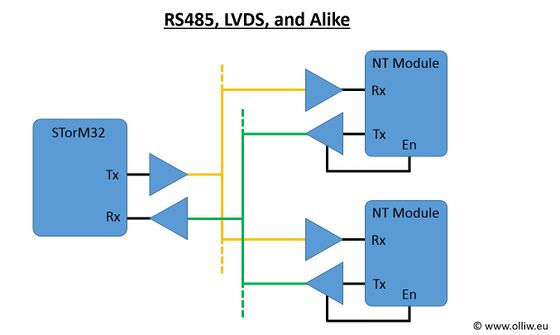RS485, LVDS, and Alike: Difference between revisions
Jump to navigation
Jump to search
No edit summary |
No edit summary |
||
| Line 3: | Line 3: | ||
The STorM32 controller supports using [https://en.wikipedia.org/wiki/RS-485 RS485], [https://en.wikipedia.org/wiki/Low-voltage_differential_signaling Low Voltage Differential Signaling] (LVDS), and other bus drivers for its NT bus. | The STorM32 controller supports using [https://en.wikipedia.org/wiki/RS-485 RS485], [https://en.wikipedia.org/wiki/Low-voltage_differential_signaling Low Voltage Differential Signaling] (LVDS), and other bus drivers for its NT bus. | ||
For that purpose the NT modules provide two pins, one active high and one active low, which allow us to enable/disable the respective transmit | For that purpose the NT modules provide two pins, one active high and one active low, which allow us to enable/disable the respective transmit drivers on the NT modules. | ||
{| class="wikitable" style="text-align: center;" | {| class="wikitable" style="text-align: center;" | ||
Revision as of 12:01, 3 September 2019
The information on this page refers to firmware v2.43 and higher.
The STorM32 controller supports using RS485, Low Voltage Differential Signaling (LVDS), and other bus drivers for its NT bus.
For that purpose the NT modules provide two pins, one active high and one active low, which allow us to enable/disable the respective transmit drivers on the NT modules.
| NT Module | active HIGH pin | active LOW pin |
|---|---|---|
| NT Imu v2.x | PA0 | PA15 |
| NT Motor v2.x | PA0 | PA15 |
| NT Logger v1.x | PA0 | PA15 |
For discussions see here and follow up posts.
